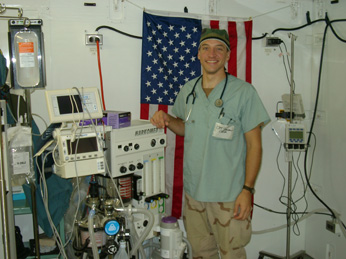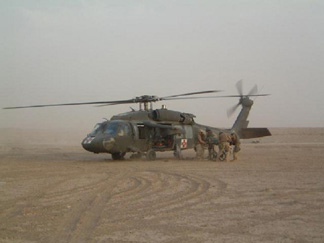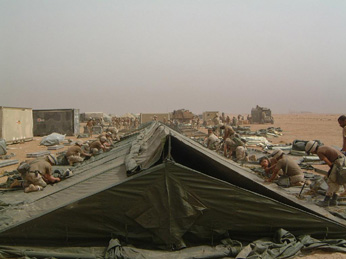 |
Capt. Jeff Schrader stands inside the operating room next to the anesthesia machine. |
A 1994 graduate of the UNMC College of Nursing, Schrader recalls how an Iraqi girl walked up to give the soldier an object she couldn’t identify. Knowing the object was a cluster bomblette, the soldier tried to take it from the girl and throw it away from her and nearby American soldiers.
The bomblette exploded.
Schrader, 37, said he provided anesthesia during the soldier’s initial surgery, resuscitated him and ultimately cared for him during evacuation to Kuwait where the soldier in his mid-20s was transported to an American military hospital in Germany. The soldier later died in Germany.
“This particular soldier’s injuries were very severe and life-threatening,” Schrader said. “His left leg was amputated from the explosion and his right leg from the knee down was destroyed, as well as most of one of his hands.”
 |
Soldiers load an injured soldier onto a Blackhawk helicopter. Capt. Jeff Schrader rode aboard helicopters like this one that were fired on from the ground. |
Schrader, who grew up in Palmer, Neb., recalls many experiences in Kuwait and Iraq, from March 11 to Oct. 11, 2003, including one of his rides aboard a helicopter with patients in Iraq. While preparing to land in Baghdad, the helicopter began swaying back and forth.
“After we landed, the medic apologized for the rough ride,” Schrader said. “I asked him what was wrong. He said the pilot was trying to avoid ground fire. At that point, I was in shock.”
Schrader also remembers the fear he and his colleagues experienced when they first arrived in Iraq after the war began. “I had big questions… fear of the unknown, anxiety, not knowing what was going to happen next,” Schrader said.
 |
Capt. Jeff Schrader and his colleagues construct their first hospital. |
During the drive in Kuwait, Schrader estimates he and his colleagues donned their nuclear, biological and chemical gear in the desert heat about 20 times, sometimes wearing it for 30 minutes to an hour in response to missile attacks and potential threats of bioterrorism.
The trek took three days, plus five more days of waiting for their area to be secured. The time heading to Baghdad seemed surreal, he said.
“You didn’t know what was going to happen,” he said. “We were riding along waiting for something to happen. Nothing traumatic happened. We didn’t see enemy soldiers, nor were we attacked, but often saw gunfire and heard explosions in the distance. We also saw Iraqi SCUD missiles being intercepted overhead by American Patriot Air Defense Missiles.
|
As an LPN, he worked for a year at Mary Lanning Hospital in Hastings, then joined the Army in 1986. He was stationed in Hawaii until 1989 then returned to the Guard and worked parttime in a medical platoon to pursue a bachelor’s degree in nursing from UNMC’s College of Nursing Lincoln Division. Upon graduation in 1994, he stayed in Nebraska and worked at Bryan Memorial Hospital in progressive care and then in the intensive care unit. In 1996, he was commissioned in the U.S. Army Reserve, ultimately earning a master’s degree in nursing as a nurse anesthetist from the Army’s Uniformed Services University in Bethesda, Md. Since completing his degree, he’s been stationed at Walter Reed Army Medical Center in Washington, D.C. |
“All of us were scared. I think that’s when the camaraderie solidified in our unit.”
The unit encountered asphalt so hot the truck tires melted. Food, water and supplies were rationed when they became low. The little water they had was used for drinking and hygiene. They didn’t shower for four weeks.
“Everyone was pretty funky, but we knew we were all in the same situation so you just didn’t notice or care after a while,” he said.
Schrader said the first three weeks after setting up the hospital were busy with casualties from Baghdad. Their first patient was an Iraqi prisoner-of-war. Schrader and his colleagues worked four to 18 hours a day providing care to injured soldiers, Iraqi civilians and prisoners-of-war.
Schrader said other work was comprised of improving the hospital structure, filling thousands of sandbags and making a living area.
The makeshift hospital had all the necessities of a hospital – X-ray, pharmacy, lab, operating room and patient care wards. Schrader likened some physical parts of the structure to that of a large cargo trailer in which the walls folded down and formed a sealed room. The wards were composed of tents with vinyl/plastic floors and sandbags all the way around the outside.
It was a dusty place but amazingly clean inside, he said, noting, “I would have felt comfortable as a patient there.”
Later in his deployment, Schrader and a small contingent of his unit received an order to set up a 28-bed hospital outside Tikrit, the home of Saddam Hussein, to provide medical support to soldiers in the area.
“It was a very hostile area,” he said. “I was one of three anesthetists. We had an average of two to six cases a day in the operating room.”
Schrader said the time in Iraq humbled him and made him appreciate the little things he once took for granted. “You appreciate your time more,” he said. “My priorities are different. I realize my time on earth is short and that I need to appreciate the time I’ve been given and cherish it.
“The friendship and camaraderie made during the deployment was amazing. We became a family and supported each other. When someone was having a bad day, we’d help him or her through it. We would watch out for each other and take care of each other. I’m appreciative of the whole experience in Iraq. I can’t say I enjoyed it, but I’m honored to have played a little part and help American soldiers.”
He’s been back to Walter Reed Medical Center since October and plans to retire April 1, culminating 20 years of service. At the hospital, he sees many of the kind of patients he once treated in Iraq and finds it more emotionally demanding than those he treated in Iraq.
“It’s more difficult for me now to see the injured at this stage of their rehabilitation,” Schrader said. “I see how the injuries will affect their lives forever, not only physically, but also emotionally. Their lives are forever changed.
“We, as Americans, take so much for granted. Our forefathers fought to win our freedom and now America’s children fight to uphold our freedom. We’ve heard it said before, but freedom is not free.”